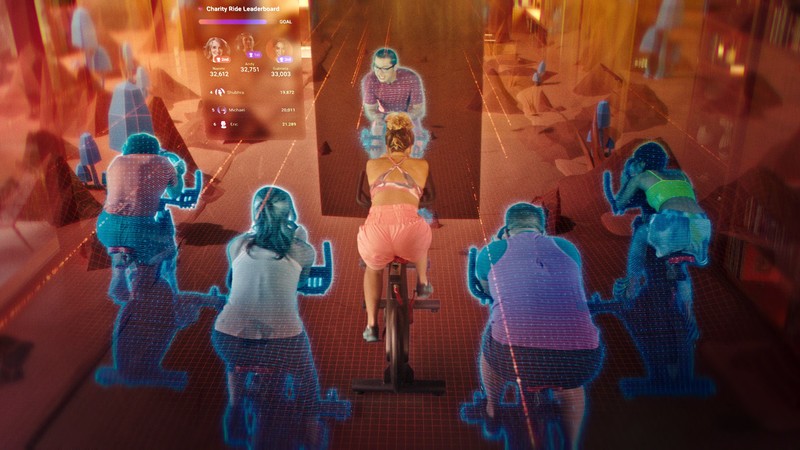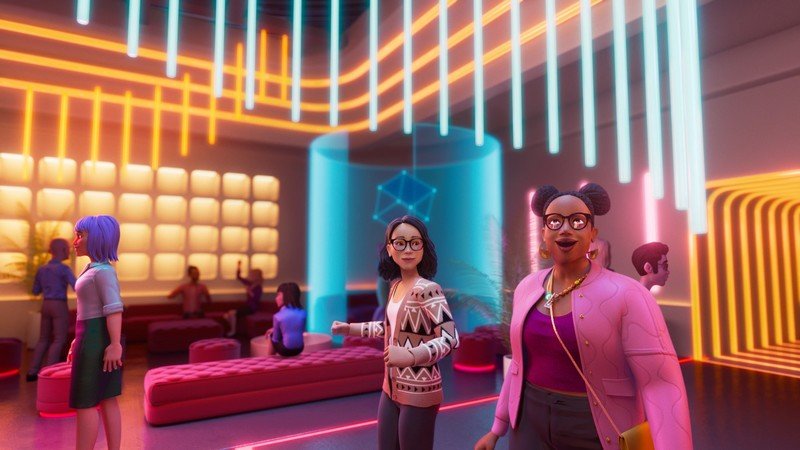The Metaverse explained: How it'll work, when it arrives, and who owns it

The metaverse of science fiction and the Metaverse envisioned by Facebook aren't one and the same. It's clever branding meant to evoke a 3D internet in the vein of Ready Player One's OASIS, with hyperrealistic graphics and fun games accessible to everyone. But Meta's spin of the Metaverse comes with both major upsides and downsides.
On the plus side, Meta has a talented team of VR developers responsible for the hugely popular Oculus Quest 2, and has acquired teams of talented game and app developers that could easily make a virtual Metaverse worth "living" in. On the downside, Facebook's history gives us reason to worry about how privacy in the Metaverse will work; and it's unlikely the Metaverse will be as open or accessible as the internet is now.
Because of the technological hurdles, the Metaverse won't arrive for years yet. But we already have plenty of info of how it will work. Here's everything you need to know about the Metaverse explained in simple terms.
What is the metaverse?

Meta describes the metaverse as "a set of virtual spaces where you can create and explore with other people who aren't in the same physical space as you." It's a simplified definition that taps into a sci-fi concept that's existed since the early 90s: a 3D, virtual recreation of the internet that's globally accessible.
In Neal Stephenson's Snow Crash, he envisioned the virtual metaverse as an ad-filled, hierarchical society. Those with more expensive VR tech could immerse more fully into the world, giving themselves lifelike virtual avatars and rare digital items; those who could only afford to use public terminals have stigmatized black-and-white avatars and are generally ignored.
Optimistic futurists describe the metaverse as a decentralized virtual world, not controlled by any one corporation or reliant on one company's hardware, built on open standards so anyone can access it (like the internet).
Some people refer to game worlds like Second Life or Minecraft as metaverses. With Minecraft, there is a single world that anyone can access across a wide range of products (including VR headsets), each person can create their own game world inside of it, and you can purchase digital items to personalize your avatar.
Get the latest news from Android Central, your trusted companion in the world of Android
But Tony Parisi, co-creator of the Virtual Reality Modeling Language (VRML), argued in "Rules of the Metaverse" that game worlds are too specific to be true metaverses. Instead, it needs to incorporate a variety of use cases beyond gaming, for a much larger scale and scope — again, just like the internet.
Don't envision the metaverse as a virtual world you access in a Quest headset, in other words. Done right, the metaverse should contain 3D virtual worlds of all shapes, sizes, and purposes, accessible from a variety of products and backed by tons of different companies. At the same time, you'll be able to access it in the "real world" through augmented reality.
Facebook's "Metaverse" explained
In Meta's envisioning, the Metaverse is a mixed-reality world that relies on both virtual and augmented reality to work. And Meta hardware and software will be at its center.
In the announcement livestream linked above, Mark Zuckerberg broke down all of the defining characteristics of his company's Metaverse. While we can't verify how many of them will actually happen, we've summarized his claims below:
- It'll have digital avatars that provide a sense of "presence." They'll mirror your real-world expressions and body language so it feels like the person is really there, either as a virtual person or AR hologram.
- Artists will create digital "3D objects that can respond and react realistically, including a realistic sense of depth and occlusion." They can sell those objects to consumers, who can decorate virtual rooms or their real-life surroundings with art. You can also buy your avatar clothing you can wear across different experiences.
- You'll also be able to bring real-world objects into VR. Though it's not clear if you'll be able to scan anything you own or if the company will need to create a digital version that is bundled with the physical one.

- Controls will range from controllers to gestures to voice commands, or even "make things happen by thinking about them."
- Metaverse games will "span from immersive experiences and fantasy worlds to bringing simple games into our everyday lives through holograms." Their game demos ranged from Quest-style VR minigames to AR fencing against an opponent in real time. And you can be certain the best Quest games will be available as well.
- There will also be virtual workrooms, educational classrooms for virtual field trips and interactive lessons, and more adult educational opportunities like virtual surgeries or car repair.
We can't necessarily predict how Meta will execute its spin on the Metaverse, as many of its ideas may not come to fruition a decade from now. But in essence, the Metaverse is a collection of spaces, games, and apps where you and your surroundings will only look as cool as you can afford.
Who owns the Metaverse?

In its press release, Meta claimed that "the metaverse exists whether Facebook is there or not." But that's not really true. It's not the open internet 2.0 as much as it is the internet as envisioned by Zuckerberg.
Meta is investing "many billions of dollars for years" to get it up and running, including hiring for 10,000 engineering jobs in Europe to create it. It will certainly partner with other companies to include their apps and games in the Metaverse, but it is Meta's system to control and profit from.
In his Metaverse reveal, Zuckerberg explained that the Metaverse economy will funnel through Meta's own store. They'll "aim to offer developer and creator services with low fees in as many cases as possible" but will "need to keep some fees higher for some period to make sure that we don't lose too much money on this program overall."
Zuckerberg says that "we'll be supporting side loading and linking to PCs so consumers and developers have a choice rather than forcing them to use the Quest Store to find apps or reach customers." But that's still the furthest thing from an open system. Most people don't bother with side-loading, which means most creators will have to use Meta's store and follow its content guidelines to make money. Nor is there any indication that the Metaverse will be accessible on other companies' VR headsets or AR glasses.
Unless future Meta products support alternate app stores or Meta truly makes the Metaverse with an open standard that anyone can use, the Metaverse will definitely be owned and controlled by Meta, with a portion of all sales and ad revenue going to the company.
When will the Metaverse launch?

Zuckerberg hasn't given a concrete timeline, and this isn't a product launch in the traditional sense. Meta will release new VR/AR products that make these concepts and technologies possible, with multiplayer or social elements baked in. Even the Quest 2 has what Zuckerberg calls their "early vision for a home space in the metaverse."
That being said, Zuckerberg has said the technology inherent in the Metaverse is still "a long ways off." By his estimation, the technology he described in his Metaverse keynote will be ready in "the next five or 10 years," while Meta's press release said "10 to 15 years." That means the Metaverse could take off anywhere from 2026 to 2036.
Which devices will access the Metaverse?

Given how far off the Metaverse is, it's impossible to give specifics. We know Meta is currently developing a new VR headset — the Meta Quest Pro — and new AR glasses codenamed Project Nazare. But by the time 2030 rolls around, we could be using the Quest 6 or Nazare X or something entirely new.
What we do know is that Meta wants you to access the Metaverse on its own VR/AR products. Many of its features rely on its photorealistic avatars that recreate your expressions and actions in real-time, which means you need devices with cameras and mics capable of capturing and transmitting your face and voice in real-time.
Meta promises to sell its devices "at cost" or subsidize the cost with software fees, which could make these devices relatively affordable. But they'll likely still cost much more than the $299 Quest 2.
Otherwise, you will technically be able to access the Metaverse "on a computer or phone." You'll have the option of joining a 3D meetup as a 2D screen, for instance. But most of its functionality will require using a VR or AR device. That makes it uncertain how accessible the Metaverse will be in poorer countries.
Privacy and safety in the Metaverse

The Meta rebranding can't mask Facebook's horrific track record. Cambridge Analytica and the more recent leak of 533 million users' data proves the company can't safeguard its thorough (if not invasive) knowledge of people's lives. Its products have been shown to make children and teens unhappier, which Facebook hid until the Facebook Files revealed the information. And the company has done much less than other social media companies to combat political and medical misinformation, particularly in non-English-speaking countries.
Keeping that in mind, we have to look carefully at Meta's plans to run its own mini-internet that primarily involves people speaking directly to one another, using devices that point cameras directly at people's faces and bodies.
In terms of privacy, Meta says it wants to "minimize the amount of data that's used, build technology to enable privacy-protective data uses, and give people transparency and control over their data." But Meta will still have access to your digital likeness, scans of objects from your home, purchase history, and a ton of other data that'll make the Metaverse more lifelike.
And in terms of safety, the Metaverse will be harder to moderate because so much of it will involve speech instead of text. Unless Meta plans to record video and audio of virtual spaces or auto-transcribe speech to analyze it — which would be its own can of privacy worms — it's unclear how the company will keep the Metaverse free of hate and harassment, unless they plan to leave this entirely up to users.

Michael is Android Central's resident expert on wearables and fitness. Before joining Android Central, he freelanced for years at Techradar, Wareable, Windows Central, and Digital Trends. Channeling his love of running, he established himself as an expert on fitness watches, testing and reviewing models from Garmin, Fitbit, Samsung, Apple, COROS, Polar, Amazfit, Suunto, and more.

